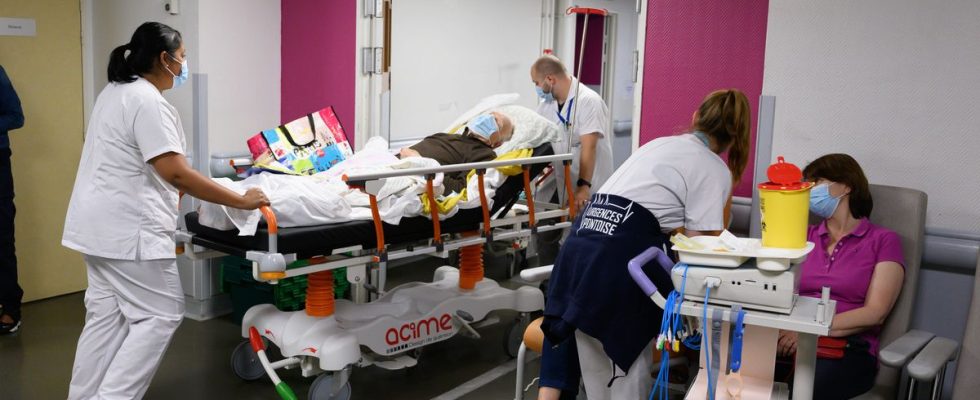Reform or no reform? The Minister of the Interior, Gérald Darmanin, announced Monday to the Assembly that the government would initiate a “reform” of State Medical Aid (AME), which covers the health costs of undocumented foreigners, at the beginning of 2024. , an insistent demand from the parliamentary right. “The government is committed (…) to responding to the demands and questions asked by the senators,” launched Gérald Darmanin at the opening of the debates on the immigration bill.
Which did not prevent the tenant of Place Beauvau from taking a snub. Later, in fact, the Assembly adopted a preliminary rejection motion by 270 votes to 265, inflicting a very heavy political defeat on the government. Examination of the text was interrupted even before the substantive articles were discussed. And the fate of the AME, which the Senate wishes to transform into simple emergency medical aid, is on hold. But what is SOUL? Who can benefit from this device? What support does it offer to beneficiaries and what is its cost? 20 minutes explains everything to you.
Who can benefit from AME in France?
“ State medical aid (AME) is a system allowing foreigners in an irregular situation to benefit from access to care. It is awarded subject to conditions of residence and resources,” explains the Directorate of Legal and Administrative Information (DILA), placed under the authority of the Prime Minister.
In practice, to be eligible, applicants must “reside in France for more than three months” and “not have had a residence permit for more than three months”. They must also “receive resources not exceeding certain ceilings”, which vary depending on whether they live in mainland France or in the Overseas Territories. [hors Mayotte, où l’AME n’est pas applicable], continues the DILA. The annual income of a single resident must not exceed 9,719 euros if they reside in mainland France and 10,817 euros in an overseas territory.
To request the AME, a file must be completed and submitted to your Primary Health Insurance Fund (CPAM). “Your CPAM will inform you of its decision no later than 2 months later,” adds DILA. If after this period you have not received a response, this means that your request has been refused. If your request is accepted, you will be invited to come and collect your AME admission card.” A card to present to the healthcare professionals consulted.
The AME is granted for a period of one year from the date of submission of the application, it must therefore be renewed each year. And “it is granted unconditionally to minor children whose parents are in an irregular situation, even when the latter do not yet benefit from it or exceed the resource ceiling”, adds Health Insurance.
What support does the AME provide to its beneficiaries?
When granted, the AME card allows the beneficiary “to prove their rights and benefit from the exemption from advance fees which are required of any healthcare professional,” indicates Health Insurance. Medical and hospital care is covered at 100%, within the limits of Social Security rates, for medical and dental care; medicines reimbursed at 100%, 65% or 30%; analysis costs; hospitalization and surgical intervention costs; costs relating to certain vaccinations as well as those linked to certain screenings; costs related to contraception or even voluntary termination of pregnancy,” she explains.
On the other hand, the AME does not cover “the costs of spa treatments, technical procedures and medical biology examinations specific to medically assisted procreation as well as the medicines and products necessary for their implementation, and medicines with low medical benefit reimbursed at 15%”, specifies the CPAM.
How much does the AME cost each year?
This is one of the major points that opposes its defenders and its detractors. For the latter, the AME, in addition to generating a “draft” for illegal immigration, is “too expensive”, with an annual cost of 1.2 billion euros per year for 400,000 beneficiaries. “A “call for air” never demonstrated, which ultimately creates a risk of infringement of the rights of all”, estimates the Defender of Rights, Claire Hédon, in an opinion published at the end of November. At the same time, the Minister of Health, Aurélien Rousseau, declared that “the AME is an essential public health system”. A device dear to the medical community which, in a recent forum signed by 3,500 doctors, estimates that a restriction of the AME “would significantly limit and delay access to care” for foreigners in an irregular situation by depriving them of access to community medicine, and would cause “an increase in the use of urgent hospital care, which is more complex and more expensive”.
To date, “the AME represents 0.4% of France’s healthcare expenditure, so explaining to us that it is because of foreigners that there would be a hole in the Social Security budget is absurd”, insisted a few weeks ago the president of the LFI group to the Assembly Mathilde Panot.
Each year, “470 billion euros in benefits are paid by Social Security”, specifies Social Security, including 235.8 billion euros in consumption of care and medical goods. Which confirms the percentage of 0.4% of expenses put forward by LFI or by François Braun, predecessor of Aurélien Rousseau, who brush aside the hypothesis of abusive recourse to the AME or a “call for fresh air” . This is confirmed by the NGO Médecins du Monde in its report on AME published in mid-October, according to which nearly nine out of ten people eligible for AME do not use it: “Nearly 87% have not of rights open in France”.

